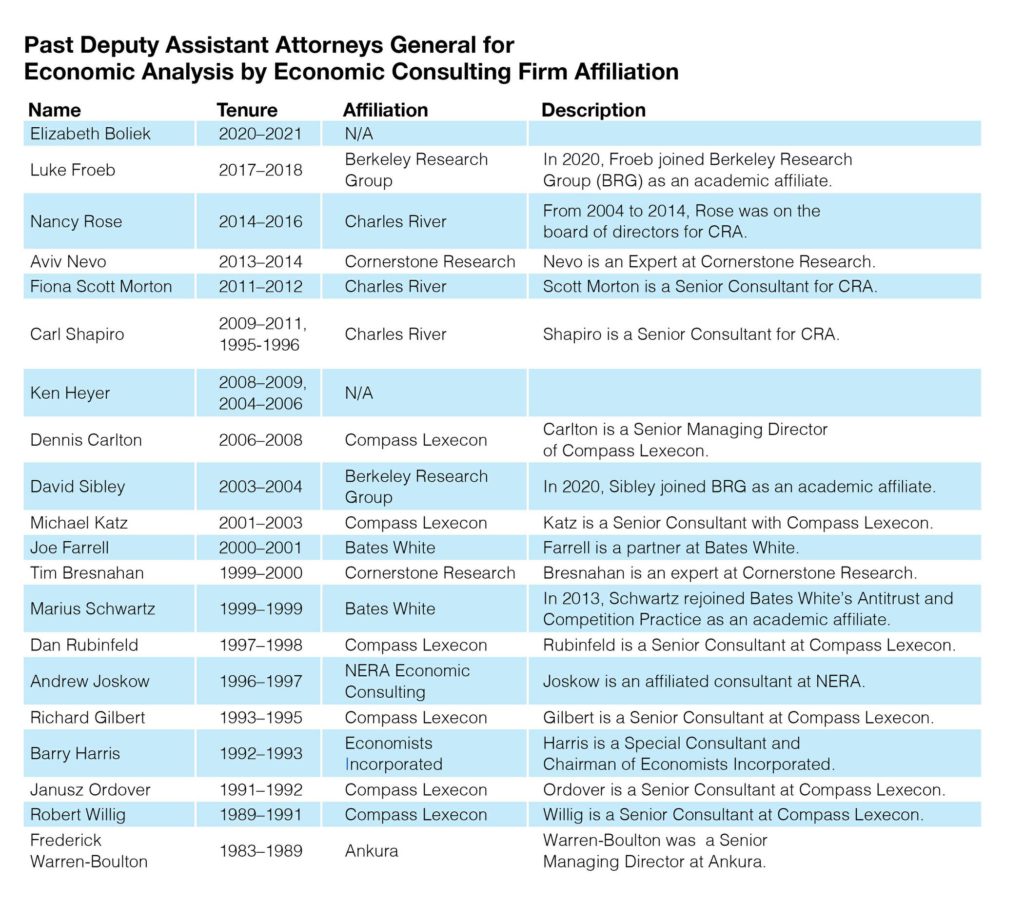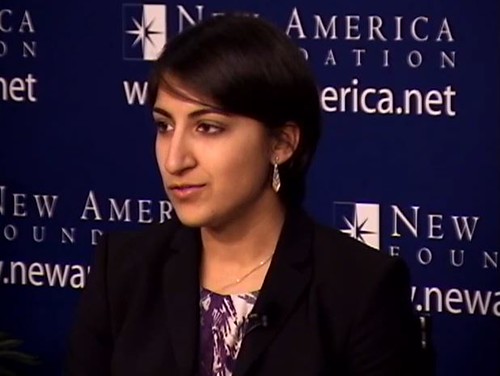Read this article on the original website.
The nomination of consumer privacy advocate Alvaro Bedoya to the fifth and final seat on the Federal Trade Commission reaffirmed the Biden administration’s willingness to take on the Big Tech giants. Along with FTC Chair Lina Khan, Commissioner Rebecca Kelly Slaughter, and the Justice Department’s Assistant Attorney General Jonathan Kanter, Bedoya will have the power to push back on Big Tech as well as other dominant corporations.
But below the high-profile leaders of Biden’s antitrust agenda, the FTC and DOJ contain many other influential positions that have long been filled with corporate allies. As I explore in a forthcoming white paper for the Revolving Door Project, an alarming number of the lawyers and economists who handle the day-to-day enforcement duties of the antitrust agencies end up switching sides to work for the economic consulting and law firms that represent the very corporations the FTC and DOJ are charged with overseeing.
One position that’s had a particularly questionable track record is that of deputy assistant attorney general for economic analysis. The so-called “DAAG”—everything in DC comes with an intentionally obscuring acronym—oversees the Antitrust Division’s Economic Analysis Group, a team of economists who incorporate “internal corporate data, business documents, and information from interviews of executives to understand and model competition.” The economists’ analysis is crucial to the DOJ’s investigations into corporations seeking to merge. Upon his confirmation, Kanter will have the opportunity to pick a new chief economist to lead the Economic Analysis Group. Hopefully, his DAAG pick will differ significantly from the predecessors, who overwhelmingly went on to use their expertise on behalf of private economic consulting firms once they’d left the DOJ.
Under the judiciary’s current dominant consumer welfare standard, much of the question of what is anti-competitive action and what isn’t boils down to how it affects prices for consumers. This paradigm means the opinion of economists is highly valued. And by highly valued, I mean extremely lucrative.
Consulting firms such as Compass Lexecon and Bates White hire economists and antitrust academics to provide analysis and testimony for clients, charging the clients potentially thousands of dollars an hour. To be clear, the consultants are paid by the firms trying to merge. They aren’t hired to produce or follow independent and scrutinizing analysis wherever it leads; they’re paid to find a reason why their clients’ mergers should be approved. ProPublica found that former DAAG for Economic Analysis Dennis Carlton and Compass Lexecon charged $1,350 an hour in 2014 for his expert witness services; his clients include AT&T in its mergers with Time Warner and SBC Communications. While many of these firms’ consultants appear to be plucked from academia, they also frequently have experience as FTC and DOJ economists. Antitrust economists with public-sector experience are in high demand by economic consulting firms. How high? Looking at the 20 most recent economists to work as the deputy assistant attorney general for economic analysis, we found that 17 went on to work for an economic consulting firm. In other words, 85 percent of people who’ve directed the economics group charged with overseeing merger enforcement have gone on to take jobs that serve to undermine the independent analysis of that division.
One DAAG, Nancy Rose, has apparently not joined a firm since leaving the DOJ—but before her tenure as DAAG, she was on the board of one of the most prominent economic consulting firms, Charles River Associates, for ten years. The two chief economists with no apparent ties to an economic consulting firm are Ken Heyer, who served as DAAG in both 2004 and 2008, and Elizabeth “Babette” Boliek. Boliek was appointed by former Assistant Attorney General Makan Delrahim shortly before he left, making her one of three Trump-allied officials who temporarily led Biden’s Antitrust Division after the transition. Boliek left the position only two months into the job.
The rest of the former chief economists joined firms like Charles River, Bates White, and Compass Lexecon after leaving the position. This means that since 1983, all but two DAAGs were tied to an economic consulting firm with an antitrust practice.

Who exactly do these former public officials take on as clients at the consulting firms? Both corporations and the federal government depend on expert witnesses to win antitrust cases. While most information on economic consulting firm clients is self-reported and difficult to comprehensively track, the Cornerstone Research biography of Aviv Nevo, one of the Obama-era DAAGs, gives us an idea of how often former public officials wield their experience to benefit corporations. Nevo lists eight cases he consulted on with Cornerstone Research. In three of the cases, he represented the FTC or DOJ. In the other five cases, he represented corporations before the FTC or DOJ, namely Qualcomm, Cigna, 21st Century Fox, Bain Capital, and the Commercial Metals Company.
The revolving door between economic consulting firms and antitrust enforcement presents problems that illustrate the need for the cultural change that must occur if the DOJ and FTC are to become entities that aggressively and emphatically challenge corporate dominance.
One solution is bringing expert witnesses in-house. Despite the existence of the Economic Analysis Group in the Antitrust Division at the DOJ and the Bureau of Economics at the FTC, both of which ostensibly exist to research economic rationale behind antitrust enforcement actions, both agencies regularly depend on consulting firms for expert economic witnesses. According to a 2019 FTC Inspector General report, the costs of economic and technical witnesses have ballooned, presenting “one of the agency’s top challenges.” The report recommended looking into bringing such experts in-house.
High costs are no wonder, considering that economic consulting firms take on both the government and corporations as clients—and in a competition of who has deeper pockets for witness costs, monopolistic corporations will clearly win. This is also just one example of the much broader problem of the federal government outsourcing its core functions, as anti-monopolists like Matt Stoller have written about consistently.
Consulting firms also occasionally end up playing for both teams. In the Apple e-books price-fixing case, Compass Lexecon dispatched two expert witnesses with differing economic analysis: its witness for the federal government argued that Apple inflated e-book prices by 19 percent, while its witness for Apple argued the inflation was only 1.9 percent.
Bringing expert witnesses in-house would eliminate this particular problem, as well as allowing these agencies to employ more career public servants with the cost savings. Similar efforts to bolster the expertise at the agencies could also encourage ambitious employees below the level of political appointee to continue within the public sector. Antitrust agencies thus could more readily promote from within; they wouldn’t have to turn to the revolving door. Positions like the DAAG could be filled more often with economists who’d worked their way up in the Antitrust Division. More funding could also go to increased salaries to make the DOJ and FTC more competitive with corporate-allied firms that want to poach employees.
On the appointee level, the Revolving Door Project’s proposed executive order on ethics would establish more stringent post-employment rules that could disincentivize federal officials from joining the corporations they once helped oversee (or the consultancies and law firms those corporations hire). One provision would ban every official in an executive agency, after leaving office, from making any “communication to or appearance before an officer or employee of the executive agency” where they’d been employed on behalf of a corporation or a nonprofit that principally lobbies for for-profit interests. This would effectively ban chief economists from representing corporations in front of the agency they’d served, significantly denting economic consulting firms’ ability to employ high-profile officials.
President Biden has put in place all the top players required to carry out the aggressive antitrust agenda he needs to rebalance the economy in favor of workers, consumers, and small businesses. But to make a lasting impact on the DOJ Antitrust Division and the FTC, his appointees will have to tackle the corrosive influence of economic consulting firms and other corporate allies.
Image: “Lina Khan” by New America is licensed under CC BY 2.0

